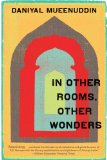Summary | Excerpt | Reading Guide | Reviews | Beyond the Book | Readalikes | Genres & Themes | Author Bio

• • •
Two days later K. K. Harouni flew to Rawalpindi, to attend a meeting of the board of governors of the State Bank—one of the few positions he still held, a sinecure—the real policy was decided elsewhere, Harouni and other eminences unknowingly acting to camouflage self-serving deals and manipulations.
Shah Sahib, who had accompanied his master to the airport, stood next to Samundar Khan in the parking lot, leaning against the hood of the car, wearing a gray suit with excessively broad lapels.
A jet taxied out and came hurtling down the runway, then climbed smoothly through haze, toward Rawalpindi to the west, locking its wheels up.
“Let’s go,” said Shah Sahib.
As they drove out the airport gate, Samundar Khan said, “May I take you home?”
Shah Sahib glanced over at him. “I need to pick up some things for my wife. Then you can take me home.”
“Well, Shah Sahib’s out of the way,” Samundar Khan said, walking into the kitchen.
Hassan stood at the stove over an enormous pot of boiling oil, cooking the samosas, which Rafik and Saleema were assembling at a table, filling them with meat and bhang. Rafik had told the servants that he would be passing around samosas to celebrate good news from home, but everyone saw through this. The drivers and their gang were fully on board, and had sent Samundar Khan to make sure they got a heaping plate. The old gardener had left, but the younger one had sidled into the drivers’ quarters and wanted to join in. The oldest of the sweepers, a thin balding man with a meek, servile expression, sat out in the courtyard hoping that he would be included. Whenever he could afford it he would buy himself a stick of hash to smoke at home after the day’s work.
All the bhang had been used up. A pile of samosas steamed in a plate.
“Okay, now it’s us,” said Rafik.
Hassan turned his back and raised the lid on a saucepan. “Not me.”
But he ended up having some.
Saleema and Rafik sat in his room eating samosas. At first she had refused, but he pressed her.
“Now what?” she said.
“Sit here and tell me a story. Tell me about when you were a girl.”
Neither of them had spoken much of their pasts or their homes. She knew that he had a wife and children, two sons, and shied away from anything bringing it to mind.
“What shall I say? I was brought up with slaps and harsh words. We had nothing, we were poor. My father sold vegetables from a cart, but when he began smoking heroin he sold everything, the cart, his bicycle, the radio, even the dishes in the kitchen. Once a man—a boy—gave me a little watch—he brought it from Multan—and my father pushed me to the ground and took it from my wrist.”
“Poor girl, little girl, how could he do it?” He rolled her over onto the bed and kissed her neck, under her chin. Stopping for a moment, he stood and locked the door.
She didn’t tell him the worst, much worse things. Her father came into her room at night and felt under her clothes.
For the first time, Rafik touched between her legs. She opened the drawstring of her shalvar, then took off her shirt sitting up on the bed. Her small breasts stood out, her ribs.
He turned off the lights, but she said, “No, I want to see you.”
“This old body? Leave it, there’s nothing to see.”
“For me you’re not old.”
The bhang had begun to affect her, she felt the dimensions of the room, the light, the calendar on the wall that showed a picture of the Kaaba, the black cloth covering the stone and crowds circling around it. How strange, she had never before seen the roof, made of bricks and metal rods, the little high window to let in air. She felt aroused, yet wanted to get up, to go somewhere. She took off his clothes, peeling off his tan socks. Their skin touched. Standing up and going to the corner, she bent down on purpose to pick up her shirt, letting him see her. She saw reflected in his eyes the beauty of her young body. They made love, he came almost immediately, then lay on her.
Excerpted from In Other Rooms, Other Wonders by Daniyal Mueenuddin. © 2009 by Daniyal Mueenuddin. Excerpted by permission of W.W.Norton & Company. All rights reserved. No part of this excerpt may be reproduced or reprinted without permission in writing from the publisher.
Outside of a dog, a book is man's best friend. Inside of a dog it's too dark to read.
Click Here to find out who said this, as well as discovering other famous literary quotes!
Your guide toexceptional books
BookBrowse seeks out and recommends the best in contemporary fiction and nonfiction—books that not only engage and entertain but also deepen our understanding of ourselves and the world around us.